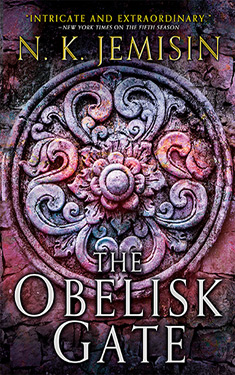N.K. Jemisin
Completed 5/6/2017, reviewed 5/7/2017
4 stars
There’s something about Jemisin’s writing that is absolutely
amazing. Even though this book suffers
from second book in a series sag, the writing is still brilliant and some subplots
that seem, well, plotless, are still wonderful to read. The book is a continuation of The Fifth Season, with the adventures of Essun, an orogene. As I noted last time, think of her as an
earth bender, for those who may be familiar with the “Avatar: The Last
Airbender” animated series. The book
also follows what happened to her daughter, Nassun, who from the first book, we
know was kidnapped by Essun’s husband after he killed their son. Essun is still searching for Nassun. By the way, since this is a second book,
there are some spoilers from the first book, but I’ll try to keep it minimal.
 The most masterful part of this book is once again the
person of the narrator in each section of the book. There are short first person segments. The story of Essun is told in second
person. The story of Nassun is told in
third person. While still a difficult
way to read a story, the second person parts are very natural. While I think it is only the third book I’ve
read employing second person (though I’ve read a couple of short stories
employing it as well) I have to say it is the most amazing writing I’ve ever
experienced. Only occasionally did it
bog me down, sometimes losing my stamina for maintaining the story.
The most masterful part of this book is once again the
person of the narrator in each section of the book. There are short first person segments. The story of Essun is told in second
person. The story of Nassun is told in
third person. While still a difficult
way to read a story, the second person parts are very natural. While I think it is only the third book I’ve
read employing second person (though I’ve read a couple of short stories
employing it as well) I have to say it is the most amazing writing I’ve ever
experienced. Only occasionally did it
bog me down, sometimes losing my stamina for maintaining the story.
Like the first book, there is a mystery to who the narrator
is. This time the narrator is a
different person from the first book. I
think it’s revealed about halfway through the book, but I believe I missed it
and didn’t figure it out until the end.
But figuring out who the narrator is helps explain a plot hole, that
being the use of the word “magic”. In
Essun’s story, we find out that “magic” is a secret word from the past that is
no longer used today. Yet it appears in
Nassun’s narrative. But once you find
out who the narrator is, you get that Nassun can think about things in terms of
magic because the narrator is a little omniscient.
Essun and Nassun are both wonderful characters. Surprisingly, they are both anti-heroes. As much as you want to like them, you can’t
completely because they do harm with their powers. Nassun really stole the show for me in this
book. Essun’s story line of settling in
an underground community was a little slow.
Nassun’s story line of going on the lam with her murderous father is
much more riveting. It was very
interesting following her process of loving her dad to realizing that he is
anathema, trying to get her cured of her orogene powers rather than supporting
her growing into them. Of course, the
father is only reacting as badly as most of the population does toward the
orogenes. It is why he killed his
son. But she is daddy’s little girl and
he’s going to get her fixed.
As with the first book, this one is very diverse, with all
sorts of persons of color and different orientations. There’s even a different race, the stone
eaters, who we don’t even know for sure that they’re human, but are perhaps more
human than either “stills” or the “roggas”.
The stone eaters come more into play in this book as well with Hoa
playing a larger role.
Even though I note that there is a sag to this book, namely
in the slowness of the buildup of Essun’s plotline, I give this book four out
of five stars. It is the second of
perhaps the most imaginative series I’ve ever read.
No comments:
Post a Comment